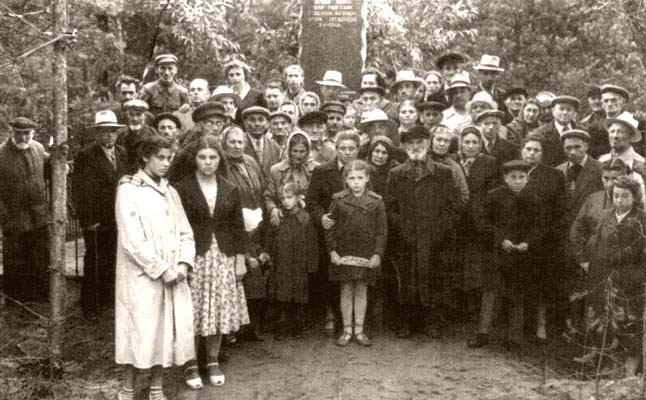

Project «Voices of Jewish settlements. Vitebsk region.»פיתוח קשרי התרבות בין העמים של ישראל ובלרוס
|
|---|
Website search |
|
MainNew publicationsContactsSite mapVitebsk regionMogilev regionMinsk regionMarina Voronkova
|
Moisey MitsengendlerON THE WAY TO THE FERRYI was walking from the ferry in the streets of my town. On the way from the town center to the ferry there used to be a two-storey wooden house, a brick house behind it, then a blacksmith’s workshop, which bordered on Abram Pozharin’s garden. Before the revolution Abram was responsible for earl Uvarov’s forest land. His wife Feiga was my grandmother’s sister. Abram was quite a rich person. He did not have children. When my grandmother became a widow with two children at the age of 35, Abram Pozharin took her family to stay at his house in Beshenkovichi. Her elder son Lazar was 11 and my father Sholom – only 5. I was born in that house on January 25th 1926; uncle Abraham died a couple of hours later. The town used to have a big park with squirrels, ponds with swans. The main attraction of the town was the earl’s palace. According to stories, it had 365 windows, the same as the number of days in a year. Every day a new window would be opened. Napoleon stayed there when he was heading for Moscow. Once a year the town residents were allowed to visit the palace. This was before the revolution and the war.  Memorial opening
Memorial opening
Then there was the German invasion. Yakov Ruhman, who now lives in Carmiel, remembers in his publication: “Once the Germans started handing out potatoes to Belarusians. I ran there and joined the long line. When I was approaching the gate, someone from the locals shouted at me “Jude”. One of the Germans grabbed me and threw me onto the road, where a truck was passing. It was a miracle that I did not get run over.” Yakov Genin, currently residing in Rishon le Zion, recalls: “Every day the local Jews were assembled in the park, and then sent to work. One of the Germans, selecting people, took a bottle and attached it to the tip of a stick. Then he would hit the people on the backs and the heads. Both the Germans and the Nazi policemen would shoot people just for entertainment.” And then the tragic day arrived – February 11th 1942. All the Jews from Lepelskaya and Chashnitskaya streets were forced outside. They were passing the houses where they had spent their whole lives. Among them was Isaak Yudovin, my grandfather Shimon Fradkin, grandmother Sara and their daughter Frada, grandmother Mina-Riza, her elder son’s wife Luba, her grandchildren, my cousins Rachil and Borenka… My parents Sholom Mitsengendler and Gita Fradkina, together with me, came to Beshenkovichi every summer. However in June 1941 we did not come, because my brother Grisha was born. His birth saved us from a horrible death. My uncle Lazar Mitsengendler also survived. As soon as Vitebsk was liberated, he came back to Beshenkovichi in hopes of finding his relatives. He did not. They were all buried in a mass grave next to a forest. There is a memorial. We took a photo at the opening of the memorial. The first person on the left is Sonia Rubich, the fourth on the left, the small girl, is Inna Glickman, her sister, behind Inna – their mother. The sisters are now living in Arad. In the top right corner there is Lazar Moiseyevich Mitsengendler (in a cap). |
|||
|
|
Jewish settlements in Vitebsk regionVitebsk • Albrehtovo • Babinovichi • Baran • Bayevo • Begoml • Beshenkovichi • Bocheikovo • Bogushevsk • Borkovichi • Braslav • Bychiha • Chashniki • Disna • Dobromysli • Dokshitsy • Druya • Dubrovno • Glubokoye • Gorodok • Kamen • Kohanovo • Kolyshki • Kopys • Krasnopolie • Kublichi • Lepel • Liady • Liozno • Lukoml • Luzhki • Lyntupy • Miory • Obol • Oboltsy • Orsha • Osintorf • Ostrovno • Parafianovo • Plissa • Polotsk • Prozorki • Senno • Sharkovshina • Shumilino • Sirotino • Slaveni• Smolyany • Surazh • Tolochin • Ulla • Verhnedvinsk • Vidzy • Volyntsy • Yanovichi • Yezerishe • Zhary • Ziabki • |
Main |
New publications |
Contacts |
Site map |
Vitebsk region |
Mogilev region |
Minsk region |